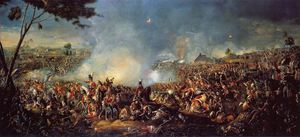 Global Information
Global InformationBattle of Waterloo information
| Battle of Waterloo | |||||||
|---|---|---|---|---|---|---|---|
| Part of the Waterloo campaign | |||||||
 The Battle of Waterloo, by William Sadler II | |||||||
| |||||||
| Belligerents | |||||||
|
|
| ||||||
| Commanders and leaders | |||||||
|
|
| ||||||
| Strength | |||||||
72,000–73,000[a]
|
Wellington's army: 68,000 soldiers[4][5][nb 4]
| ||||||
| Casualties and losses | |||||||
26,000–27,000[nb 5]
15,000 deserted after the battle[12] 220 guns lost[8] |
Total: 24,000[13][nb 7] Wellington's army: 17,000 killed, wounded, or missing[13][nb 8]
Blücher's army: 6,604–7,000[f]
| ||||||
| Both sides: 7,000 horses killed | |||||||
Waterloo campaign


300miles
The Battle of Waterloo (Dutch pronunciation: [ˈʋaːtərloː] ⓘ) was fought on Sunday 18 June 1815, near Waterloo (at that time in the United Kingdom of the Netherlands, now in Belgium), marking the end of the Napoleonic Wars. A French army under the command of Napoleon was defeated by two armies of the Seventh Coalition. One of these was a British-led force with units from the United Kingdom, the Netherlands, Hanover, Brunswick, and Nassau, under the command of the Duke of Wellington (often referred to as the Anglo-allied army or Wellington's army). The other comprised three corps (the 1st, 2nd and 4th corps) of the Prussian army under Field Marshal Blücher, a fourth corps (the 3rd) of this army fought at the Battle of Wavre on the same day. The battle was known contemporarily as the Battle of Mont Saint-Jean in France (after the hamlet of Mont-Saint-Jean) or La Belle Alliance in Prussia (means "the Beautiful Alliance"; after the inn of La Belle Alliance).[15]
Upon Napoleon's return to power in March 1815 (beginning the Hundred Days), many states that had previously opposed him formed the Seventh Coalition and hurriedly mobilised their armies. Wellington's and Blücher's armies were cantoned close to the northeastern border of France. Napoleon planned to attack them separately, before they could link up and invade France with other members of the coalition.
On 16 June, Napoleon successfully attacked the bulk of the Prussian army at the Battle of Ligny with his main force, while a small portion of the French army contested the Battle of Quatre Bras to prevent the Anglo-allied army from reinforcing the Prussians. The Anglo-allied army held their ground at Quatre Bras, and on the 17th, the Prussians withdrew from Ligny in good order, while Wellington then withdrew in parallel with the Prussians northward to Waterloo on 17 June. Napoleon sent a third of his forces to pursue the Prussians, which resulted in the separate Battle of Wavre with the Prussian rear-guard on 18–19 June, and prevented that French force from participating at Waterloo.
Upon learning that the Prussian army was able to support him, Wellington decided to offer battle on the Mont-Saint-Jean[16] escarpment across the Brussels road, near the village of Waterloo. Here he withstood repeated attacks by the French throughout the afternoon of 18 June and almost lost the battle,[17] but was eventually aided by the progressively arriving 50,000 Prussians who attacked the French flank and inflicted heavy casualties. In the evening, Napoleon assaulted the Anglo-allied line with his last reserves, the senior infantry battalions of the Imperial Guard. With the Prussians breaking through on the French right flank, the Anglo-allied army repulsed the Imperial Guard, and the French army was routed.
Waterloo was the decisive engagement of the Waterloo campaign and Napoleon's last. It was also the second bloodiest single day battle of the Napoleonic Wars, after Borodino. According to Wellington, the battle was "the nearest-run thing you ever saw in your life".[18] Napoleon abdicated four days later, and coalition forces entered Paris on 7 July. The defeat at Waterloo marked the end of Napoleon's Hundred Days return from exile. It precipitated Napoleon's second and definitive abdication as Emperor of the French, and ended the First French Empire. It set a historical milestone between serial European wars and decades of relative peace, often referred to as the Pax Britannica. In popular culture, the phrase "meeting one's Waterloo" has become an expression for someone suffering a final defeat.
The battlefield is located in the Belgian municipalities of Braine-l'Alleud and Lasne,[19] about 15 kilometres (9.3 mi) south of Brussels, and about 2 kilometres (1.2 mi) from the town of Waterloo. The site of the battlefield today is dominated by the monument of the Lion's Mound, a large artificial hill constructed from earth taken from the battlefield itself, but the topography of the battlefield near the mound has not been preserved.
- ^ a b c d e f Bodart 1908, p. 487.
- ^ Hofschröer 1999, pp. 68–69.
- ^ a b c d e f g h i Clodfelter 2017, p. 169.
- ^ Hofschröer 1999, p. 61 cites Siborne's numbers.
- ^ Hamilton-Williams 1994, p. 256 gives 68,000.
- ^ Barbero 2005, pp. 75–76.
- ^ Hamilton-Williams 1994, p. 256.
- ^ a b c d e f Clodfelter 2017, p. 170.
- ^ Chesney 1874, p. 4.
- ^ Bowden 1983, p. 329.
- ^ a b c Barbero 2006, p. 312.
- ^ Barbero 2005, p. 420.
- ^ a b c Barbero 2005, p. 419.
- ^ Clodfelter 2017, pp. 169–170.
- ^ Albert Smith, Charles Dickens, William Harrison Ainsworth (eds.) (1851) Bentley's Miscellany, Volume 30, Publisher, Richard Bentley, p. 57
- ^ "Battle of Waterloo – The Battles of Quatre-Bras and Ligny | Britannica". www.britannica.com. Archived from the original on 1 December 2022. Retrieved 1 December 2022.
- ^ "Battle of Waterloo | National Army Museum". www.nam.ac.uk. Retrieved 15 March 2024.
- ^ Wikiquote:Wellington citing Creevey Papers, ch. x, p. 236
- ^ Marcelis 2015.
Cite error: There are <ref group=lower-alpha> tags or {{efn}} templates on this page, but the references will not show without a {{reflist|group=lower-alpha}} template or {{notelist}} template (see the help page).
Cite error: There are <ref group=nb> tags on this page, but the references will not show without a {{reflist|group=nb}} template (see the help page).